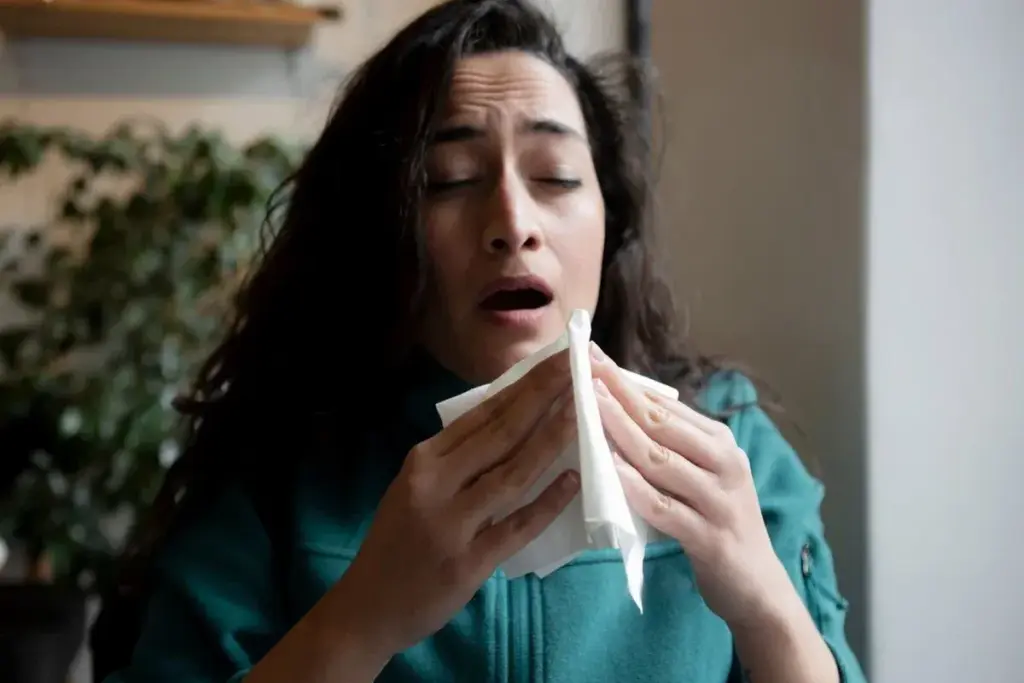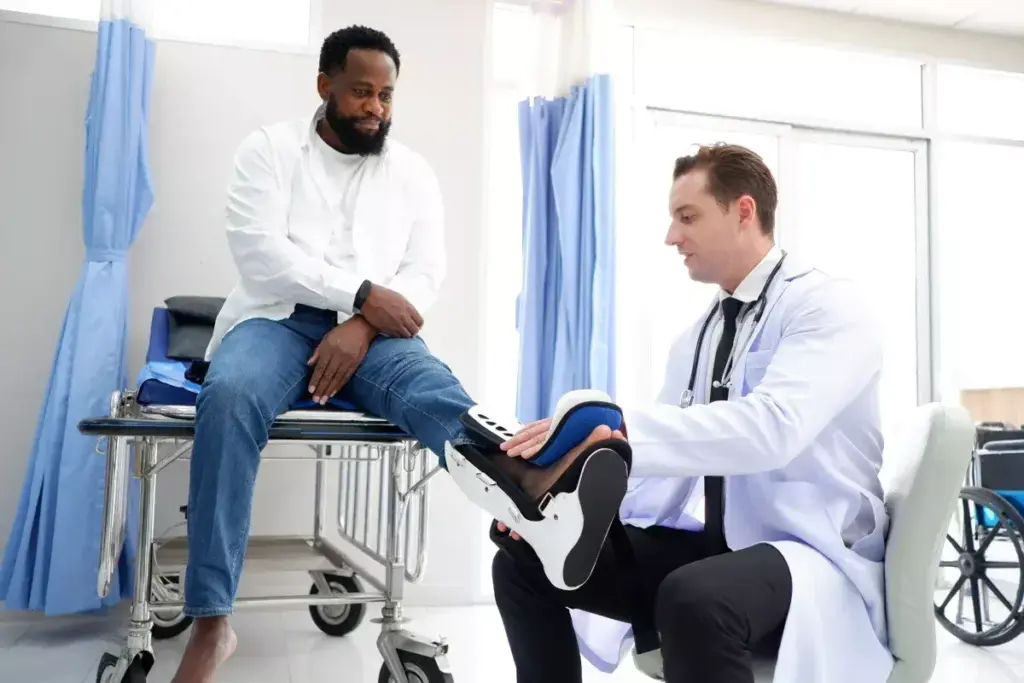What to do to stop colorectal cancer? Colorectal cancer is a big health problem worldwide. It’s the third most common cancer. Over 1.8 million new cases are diagnosed every year. This makes it a serious issue that needs our attention and awareness.
Knowing the risks and taking action can lower the chance of getting colorectal cancer. This article will share tips on how to prevent and catch it early. It aims to help people take charge of their health.
Key Takeaways
- Understand the risk factors associated with colorectal cancer
- Learn about dietary changes that can help reduce the risk
- Discover the importance of screening and early detection
- Explore lifestyle modifications that contribute to prevention
- Find out how to identify symptoms early

Understanding Colorectal Cancer
Colorectal cancer, also known as colon cancer, starts in the colon or rectum. It can often be prevented by finding and removing polyps early. Knowing about colorectal cancer is key for prevention and treatment.
What is Colorectal Cancer?
Colorectal cancer begins in the colon or rectum, parts of the large intestine. It often starts as a polyp, a growth on the inner lining. Some polyps can turn cancerous, so removing them during a screening can stop cancer.
The most common type of colorectal cancer is adenocarcinoma, making up about 90% of cases. Other types include carcinoid tumors, lymphomas, and sarcomas.
How Common is Colorectal Cancer in the United States?
Colorectal cancer is the third most common cancer in the U.S. for both men and women. The American Cancer Society reports there were 106,180 new cases of colon cancer and 44,790 new cases of rectal cancer in 2022.
The high number of cases shows why awareness and screening are so important. Key facts include:
- About 1 in 23 men and 1 in 25 women will get colorectal cancer in their lifetime.
- Risk goes up with age, with most cases found in people over 50.
- A family history of colorectal cancer or certain genetic syndromes can raise your risk.
Understanding these facts can help people see their risk and take steps to prevent it.
Recognizing Risk Factors for Colorectal Cancer
Knowing the risk factors for colorectal cancer helps in preventing it. This cancer is influenced by genetics, environment, and lifestyle. Understanding these factors is key to preventing it.
Non-Modifiable Risk Factors
Some risk factors for colorectal cancer can’t be changed. Age is a big one; the risk goes up with age, mostly after 50. Family history also matters; having a close relative with it raises your risk. Genetic syndromes like Lynch syndrome and Familial Adenomatous Polyposis (FAP) also increase the risk.
Modifiable Risk Factors
But, some risk factors can be changed. Diet is important; eating too much red meat and not enough fiber can raise your risk. Lifestyle factors like not moving enough and being overweight also increase the risk. Smoking and drinking too much alcohol are also things you can change.
Knowing about these risk factors helps you take steps to lower your risk. Eat healthy foods, stay active, keep a healthy weight, and avoid tobacco and too much alcohol.
The Role of Diet in Colorectal Cancer Prevention
Eating the right foods can help lower the risk of colorectal cancer. A diet full of essential nutrients supports health and fights cancer.
Increasing Fiber Intake for Colon Health
A high-fiber diet is key for a healthy colon. Fiber helps with regular bowel movements and prevents constipation. This can lower the risk of colorectal cancer. Foods high in fiber include whole grains, fruits, and vegetables.
Adding these foods to your diet is easy. Start with a high-fiber breakfast cereal. Snack on fruits and veggies. Also, use whole grains like brown rice and quinoa in your meals.
Foods That Promote Colorectal Health
Other foods also help with colorectal health. Antioxidant-rich foods like berries, leafy greens, and other fruits and veggies reduce oxidative stress. This stress can lead to cancer.
- Berries and other fruits high in antioxidants
- Leafy greens like spinach and kale
- Vegetables such as broccoli and carrots
- Legumes, including beans and lentils
By choosing the right foods, you can lower your risk of colorectal cancer. A balanced diet and healthy lifestyle choices greatly improve your health and well-being.
Foods to Limit or Avoid
Knowing which foods to limit is key to preventing colorectal cancer. Diet greatly affects our health, and some foods can raise or lower cancer risk. It’s important to make smart food choices.
Reducing Red and Processed Meat Consumption
Eating red and processed meat can up your risk of colorectal cancer. Red meat includes beef, pork, and lamb. Processed meat includes bacon, sausages, and ham. Reducing these meats in your diet can lower your risk.
Research shows that eating a lot of red and processed meat raises your cancer risk. The World Health Organization says processed meat is a known cancer-causing agent. This makes it even more important to cut down on these foods.
| Type of Meat | Examples | Recommended Consumption |
| Red Meat | Beef, Pork, Lamb | Limit to 1-2 servings per week |
| Processed Meat | Bacon, Sausages, Ham | Avoid or limit to occasional consumption |
Limiting Alcohol Intake
Drinking too much alcohol can also raise your risk of colorectal cancer. Too much alcohol is linked to many cancers, including colorectal cancer. Heavy drinkers are at a higher risk.
To lower your risk, drink less. Men should not have more than two drinks a day. Women should not have more than one. Drinking less not only helps prevent colon cancer but also other health problems.
The Importance of Regular Physical Activity
Exercise is key to a healthy life and helps lower the risk of colorectal cancer. It offers many health benefits, including a lower risk of colorectal cancer.
Regular exercise helps keep a healthy weight, improves insulin sensitivity, and reduces inflammation. These factors are important in lowering the risk of colorectal cancer. The American Cancer Society suggests at least 150 minutes of moderate-intensity or 75 minutes of vigorous-intensity activity each week.
Exercise Recommendations for Colorectal Cancer Prevention
To benefit from exercise in preventing colorectal cancer, follow specific guidelines. Adults should aim for at least 150 minutes of moderate-intensity aerobic activity or 75 minutes of vigorous-intensity aerobic activity per week. Also, include muscle-strengthening activities on two or more days a week to improve overall health.
- Aim for at least 30 minutes of moderate-intensity exercise per day.
- Incorporate a mix of aerobic exercises, such as walking, cycling, or swimming.
- Add muscle-strengthening activities to your routine, like weight training or bodyweight exercises.
How Exercise Reduces Cancer Risk
Regular physical activity can lower colorectal cancer risk in several ways. It helps maintain a healthy weight, reduces insulin resistance, and decreases inflammation. Exercise also improves immune function, helping the body fight cancer cells more effectively.
Key benefits of exercise in cancer prevention include:
- Improved insulin sensitivity.
- Reduced inflammation.
- Enhanced immune function.
- Maintenance of a healthy weight.
By making exercise a regular part of your life, you can greatly reduce your risk of colorectal cancer and improve your health overall.
Maintaining a Healthy Weight
Keeping a healthy weight is very important, as it helps lower the risk of colorectal cancer. Obesity is linked to a higher risk of many cancers, including colorectal cancer. So, it’s key to understand how body weight affects cancer risk.
The Link Between Obesity and Colorectal Cancer
Studies have found a strong link between obesity and a higher risk of colorectal cancer. This is thought to be due to chronic inflammation, insulin resistance, and hormonal changes in obese people. Staying at a healthy weight through a balanced diet and exercise can help reduce these risks.
Healthy Weight Management Strategies
Reaching and keeping a healthy weight requires diet changes, more exercise, and lifestyle tweaks. Here are some good ways to do it:
- Eat a Balanced Diet: Eat a variety of foods like fruits, veggies, whole grains, and lean proteins.
- Limit Unhealthy Foods: Cut down on processed and high-calorie foods that are not nutritious.
- Stay Hydrated: Drinking lots of water helps control hunger and boosts metabolism.
- Exercise Regularly: Aim for 150 minutes of moderate exercise or 75 minutes of vigorous exercise weekly.
- Monitor Your Weight: Keep track of your weight to spot patterns and make changes as needed.
By using these strategies, people can not only reach a healthy weight but also lower their risk of colorectal cancer. It’s about living a lifestyle that supports overall health and well-being.
Quitting Smoking to Prevent Colorectal Cancer
Stopping smoking is good for your lungs and lowers the risk of colorectal cancer. Tobacco is a big risk factor for many cancers. Knowing how it affects colorectal cancer is key to preventing it.
How Tobacco Use Increases Cancer Risk
Tobacco puts harmful chemicals in your body, many of which cause cancer. These chemicals can harm your DNA, leading to cancer. Smoking can make you more likely to get colorectal adenomas and carcinomas.
A study found that smoking raises the risk of colorectal cancer. The risk grows with how many cigarettes you smoke and for how long.
“The exact mechanisms by which smoking influences colorectal cancer risk are complex and multifactorial, involving genetic and epigenetic alterations.”
| Risk Factor | Impact on Colorectal Cancer Risk |
| Smoking Duration | Increased risk with longer duration |
| Number of Cigarettes | Higher risk with more cigarettes smoked |
| Age of Initiation | Earlier initiation associated with higher risk |
Resources for Smoking Cessation
Quitting smoking is tough, but there are many resources to help. You can get counseling, use nicotine replacement therapy (NRT), or take prescription drugs.
Nicotine Replacement Therapy (NRT) and Prescription Medications like bupropion and varenicline help people stop smoking.
- Counseling services
- Nicotine replacement therapy
- Prescription medications
- Support groups
If you want to quit smoking, look into these resources. Find what works for you. Quitting smoking not only lowers your risk of colorectal cancer but also boosts your overall health.
The Critical Role of Screening in Early Detection
Early detection is key to surviving colorectal cancer, and screening is the cornerstone of this effort. Screening helps identify precancerous polyps, which can be removed before they turn into cancer. Experts say, “Screening is critical for early detection and removal of precancerous polyps.”
” a statement that highlights the importance of this preventive measure.
Recommended Screening Guidelines by Age
Screening guidelines vary based on age and risk factors. Adults should start regular screening at 45. Those at higher risk, like those with a family history of colorectal cancer, may need to start screening earlier.
- Adults aged 45-75 should undergo regular screening.
- Those with a family history or other risk factors may need to start screening before 45.
Types of Screening Tests Available
Several screening tests are available, each with its own benefits and limitations. These include:
- Colonoscopy: A thorough examination of the colon.
- Stool-Based Tests: Tests that detect blood or DNA in the stool.
- Imaging Tests: CT scans and other imaging technologies.
The choice of screening test depends on various factors. These include personal preference, risk factors, and previous screening results.
Understanding Colonoscopy and Its Benefits
A colonoscopy is more than a test; it’s a way to prevent colorectal cancer. It lets doctors see inside the colon and rectum for polyps, cancer, and other issues.
Colonoscopy is key in stopping colorectal cancer. It finds and removes polyps before they turn into cancer. Knowing about colonoscopies can make people feel more comfortable about getting one.
What Happens During a Colonoscopy
A flexible tube with a camera and light is put into the rectum during a colonoscopy. This is done under sedation to make it less painful. Doctors can then spot and take out polyps or other problems.
Removing polyps is a big part of stopping cancer. By taking out these growths, the chance of getting colorectal cancer goes down a lot. This shows why regular colonoscopies are so important.
How Polyp Removal Prevents Cancer
Removing polyps during a colonoscopy stops colorectal cancer. Precancerous polyps can turn into cancer if not taken out. So, colonoscopy stops cancer from happening.
Studies show that taking out adenomatous polyps can cut colorectal cancer risk by up to 90%. This shows how powerful colonoscopy is in keeping the colon healthy.
In short, colonoscopy is a big help in fighting colorectal cancer. By knowing what it does, people can take steps to prevent it. Regular colonoscopies are a big part of staying healthy and avoiding cancer.
Other Screening Methods for Colorectal Cancer
There are many ways to screen for colorectal cancer, aside from colonoscopy. These methods are chosen based on your risk, preferences, and health history. They help find cancer early.
Stool-Based Tests
Stool-based tests are easy and non-invasive. They look for hidden blood or DNA changes in your stool. These signs can mean colorectal cancer. You can do these tests at home.
Types of Stool-Based Tests:
- Guaiac-based fecal occult blood test (gFOBT): Finds blood in your stool.
- Fecal immunochemical test (FIT): Also finds blood in your stool, but is more accurate than gFOBT.
- Stool DNA test (sDNA): Seeks DNA changes and blood in your stool.
| Test Type | Frequency | Advantages |
| gFOBT | Annually | Low cost, easy to perform |
| FIT | Annually | More accurate, no special diet needed |
| sDNA | Every 3 years | Finds DNA changes and blood |
Imaging Tests
Imaging tests let doctors see inside your colon and rectum. They’re not the first choice for screening but can find cancer by accident.
Types of Imaging Tests:
- Computed Tomography (CT) Colonography: Uses CT scans to show detailed images of your colon and rectum.
- Virtual Colonoscopy: Like CT colonography, it lets doctors see your colon.
Each screening method has its own good points and downsides. Talking to your doctor can help pick the best test for you.
How to Prevent Colorectal Cancer Through Lifestyle Changes
To prevent colorectal cancer, you need to make several changes. These include eating better and being more active. By doing this, you can lower your risk of getting this disease.
Creating a Comprehensive Prevention Plan
A good prevention plan has several parts. First, focus on dietary modifications that help your colon. Eat more fruits, veggies, and whole grains. Also, cut down on red and processed meats to lower cancer risk.
Another important part is regular physical activity. Exercise keeps you healthy and lowers cancer risk. The American Cancer Society suggests 150 minutes of moderate or 75 minutes of vigorous activity weekly.
Tracking Your Prevention Efforts
It’s key to track your prevention efforts. A health journal can help you keep track of your diet, exercise, and other changes. Reviewing your progress often helps you see what’s working and what needs improvement.
Don’t forget to schedule regular check-ups with your doctor. Talking about your prevention plan with your healthcare provider can offer extra support. It helps you stay on the right path with your prevention efforts.
Recognizing Early Warning Signs
Early detection is key in fighting colorectal cancer. Knowing the early signs can save lives. In its early stages, colorectal cancer often has no symptoms. But as it grows, certain signs become more obvious.
Common Symptoms That Shouldn’t Be Ignored
Several symptoms could mean you have colorectal cancer. These include:
- Changes in bowel movements: Diarrhea, constipation, or feeling like your bowel doesn’t empty fully.
- Blood in the stool: Seeing blood or a dark, tarry look.
- Abdominal pain or discomfort: Long-lasting cramps, gas, or pain.
- Weakness or fatigue: Feeling tired without a clear reason.
- Unexplained weight loss: Losing weight without diet or exercise changes.
These symptoms can also mean other things. But it’s important to see a doctor if they keep happening.
When to Seek Medical Attention
If you have any of these, get medical help right away:
- Severe abdominal pain that doesn’t go away.
- Vomiting blood or passing black, tarry stools.
- Significant changes in bowel habits that last more than a few days.
Early detection and treatment can greatly improve outcomes for colorectal cancer. Knowing the common symptoms of colon cancer and not ignoring them is vital for timely medical help.
The Role of Medications in Prevention
Certain medications may help prevent colorectal cancer. This has made people curious about how these drugs can stop the disease.
Aspirin and Colorectal Cancer Risk Reduction
Aspirin can protect against colorectal cancer. Studies show it can lower the risk of this cancer.
The exact way aspirin works is not fully known. But, it’s thought to be because of its anti-inflammatory effects.
Other Medications Under Investigation
Other drugs are also being looked at for preventing colorectal cancer. These include NSAIDs and hormonal therapies.
| Medication Type | Potential Benefit | Current Status |
| Aspirin | Reduced colorectal cancer risk | Established benefit |
| NSAIDs | Anti-inflammatory effects | Under investigation |
| Hormonal Therapies | Potential preventive effects | Research ongoing |
Medications might help prevent colorectal cancer, but talk to a doctor first. This is important before starting any medication for prevention.
Genetic Testing and Family History
Colorectal cancer risk isn’t just about lifestyle. Genetic testing and family history play big roles too. Knowing your genetic risk and family history can spot those at higher risk early. This can lead to early screening and save lives.
When to Consider Genetic Testing
Genetic testing for colorectal cancer is key for those with a strong family history. This includes families with many cases of colorectal cancer, or if cancers were diagnosed young. Syndromes like Lynch syndrome and Familial Adenomatous Polyposis (FAP) also raise the risk.
If a family member has one of these syndromes, testing for other relatives might be suggested. Also, those with a history of colorectal cancer or certain polyps should consider testing. Always talk to a healthcare provider or genetic counselor before getting tested.
How Family History Affects Screening Recommendations
A family history of colorectal cancer changes screening advice. Those with a first-degree relative diagnosed with colorectal cancer face higher risks. They might need to start screening earlier and more often.
The American Cancer Society suggests starting screening at 40 for those with a family history. This is 10 years before the youngest family member was diagnosed. For complex family histories or known genetic syndromes, a tailored screening plan is advised.
Grasping how family history affects colorectal cancer risk is key. It helps both individuals and healthcare providers make smart screening and prevention choices.
Conclusion
Preventing colorectal cancer needs a mix of healthy habits and staying informed. Knowing the risks and acting early can greatly lower your chance of getting this disease.
Choosing the right diet, staying active, and getting regular screenings are key. Eating more fiber, cutting down on red and processed meats, and exercising often are all good steps.
Also, knowing the value of screenings and following guidelines can catch the disease early. This makes it easier to treat. By combining these actions, you can protect your health and lower your risk of colorectal cancer.
By spreading the word about colorectal cancer and promoting healthy living, we can fight this disease together. This way, we can all enjoy better health.
FAQ
What is colorectal cancer and how common is it?
Colorectal cancer is a type of cancer that affects the colon or rectum. It’s one of the most common cancers in the U.S. Many new cases are diagnosed each year.
What are the risk factors for colorectal cancer?
Risk factors include age, family history, lifestyle, and diet. Non-modifiable risks are age and family history. Modifiable risks are diet, physical activity, and obesity.
How can diet help prevent colorectal cancer?
Eating foods rich in fiber, fruits, and vegetables can help. Foods like whole grains, legumes, and leafy greens promote colon health.
What foods should be limited or avoided to reduce the risk of colorectal cancer?
Limit or avoid red and processed meat, and excessive alcohol. Choose lean proteins and drink alcohol in moderation to lower risk.
How does regular physical activity help prevent colorectal cancer?
Regular exercise reduces obesity risk and improves health. Aim for 150 minutes of moderate exercise or 75 minutes of vigorous exercise weekly.
What is the link between obesity and colorectal cancer?
Obesity increases colorectal cancer risk due to chronic inflammation. Maintaining a healthy weight through diet and exercise can reduce this risk.
How does quitting smoking help prevent colorectal cancer?
Quitting smoking reduces colorectal cancer risk. It also improves overall health and lowers risk of other smoking-related health problems.
What is the importance of screening in early detection and prevention?
Screening is key for early detection and prevention of colorectal cancer. Regular screening can identify and remove precancerous polyps.
What is a colonoscopy and how does it help prevent colorectal cancer?
A colonoscopy is a test that lets a healthcare provider see inside the colon and rectum. It can remove precancerous polyps, preventing cancer.
Are there alternative screening methods for colorectal cancer?
Yes, there are stool-based tests and imaging tests. They can detect cancer or precancerous polyps, but a colonoscopy is more effective.
How can I create a complete prevention plan?
A prevention plan includes dietary changes, exercise, and lifestyle modifications. Tracking efforts and staying updated on research and guidelines is also important.
What are the common symptoms of colorectal cancer?
Symptoms include changes in bowel habits, blood in the stool, and abdominal pain. If symptoms last, seek medical attention.
Can medications help prevent colorectal cancer?
Some medications, like aspirin, may lower cancer risk. Always discuss benefits and risks with a healthcare provider before starting any medication.
How does genetic testing and family history affect screening recommendations?
Genetic testing and family history can show higher risk. Those with a family history may need to start screening earlier or more often.
What are the benefits of a high-fiber diet in preventing colorectal cancer?
A high-fiber diet promotes colon health and lowers cancer risk. Include whole grains, fruits, vegetables, and legumes in your diet.
How often should I get screened for colorectal cancer?
Screening guidelines depend on age, risk factors, and individual factors. Adults should start screening at 45, but those with risk factors may need to start earlier.










